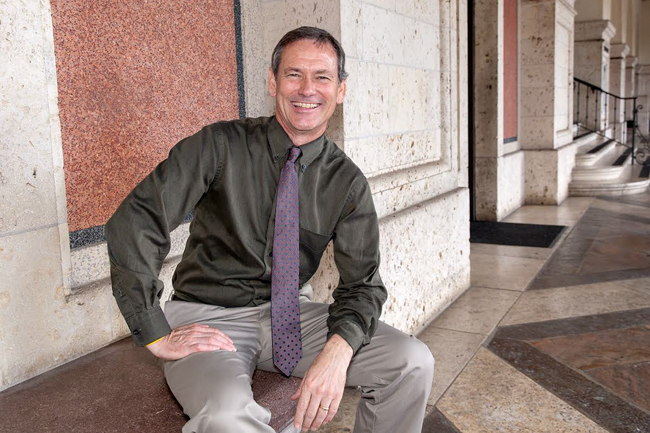Editor’s Note: This is the third in a series of Q-and-A’s with the deans of the University’s 18 schools and colleges. Brent Iverson was appointed dean of Undergraduate Studies in Summer 2013.
The Daily Texan: How would you define UGS?
Brent Iverson: There are a number of ways to come at this. For example, last night I was at an event with a bunch of adults. I do this a lot; I always ask the same question when we’re talking about UGS: I ask the adults to raise their hands if they’re doing now what they went to college to do. You don’t go to school to be a dean. I usually get maybe 10 percent of the adults raise their hands. It’s in fact the rule, not the exception, that you need to find your way a little bit. So what I really like about UGS is if you really do know what you want to do, no one slows you down. You can declare a major, you get that major, you go, and everything’s fine. If you don’t really know what you want to do, you have an option. It’s the only place that raises the fact that you might not know what you want to do. I think that having the best of both worlds is the ideal situation. I think it’s a useful model for the universities, because usually it’s one or the other. You can’t declare a major, or you have to declare a major. This idea of being able to do either of those is, I think, a really good idea.
DT: How does UGS prepare its students for the time when they’ll have to choose a major?
Iverson: It’s individual, so it all depends on who it is. There’s no one size, nor should there be. It’s based on detailed interactions with not only course advisors, but also career counsel … UT-Austin has a hundred different majors to choose from, and there are a lot of different ways to get to the same place.
DT: How did your chemistry background prepare you to be the dean of UGS?
Iverson: I don’t think that is the right question. I think “Why am I prepared for this position?” is the right question. And there are three things that are important. Studying chemistry was not one. But it is in the context of teaching very large organic chemistry classes to a very diverse group of students, diverse in every sense of that word: different majors, different backgrounds, going different places. In the chemistry department we refer to it as service teaching, but that in general we’re not teaching to the chemistry majors; we’re teaching to all the other different majors that require chemistry. So I was very used to interacting with a very large number of students from a wide variety of places, and that was kind of a natural part of my teaching. The most important reason I think I’m prepared to be the dean of Undergraduate Studies is because I’ve had three kids who’ve gone through UT. So it actually isn’t my professional experience; it’s my experience as a father. It’s very different to experience the University from my office and the classroom than it is from the dinner table. [My kids] didn’t live at home, but we certainly knew what was going on. So the things that a student confronts, all the things that you’ve had to navigate, I now understand, which I didn’t before … I’ve seen this from multiple points of view, and your experience is not what faculty think your experience is. It’s very different, because you now get the entirety of a person, and as a faculty member we have a domain that’s our domain and we understand that, but we don’t understand what you do when you leave our domain. That’s what you pick up real quick when you’re a parent.
DT: All faculty were once students, so where do you think this misunderstanding comes from?
Iverson: Things change, so it’s a new experience, everything about your experience in the University, your plans, what you’re thinking about doing. Most of the jobs that you’re thinking about weren’t even created when I was in college. That’s the easiest way to say it. Things just change, and our country, our civilization, has seen unprecedented change … I was on the task force that helped create the school. So I went through the process of understanding where it was coming from, what we were trying to accomplish from that point of view, and that’s critical because I didn’t walk in not knowing what the long-term mission was … I will say, there is [an] ingredient that’s not a matter of preparation, but that I fundamentally believe in the mission of what we’re doing. I think we’re at the forefront of change in all of higher education. I think UT is way ahead of its time. And the reason that no one knows what UGS is — they don’t know how to put it in a category — is because we are way ahead of our time, and that’s something I’m very excited about.
















